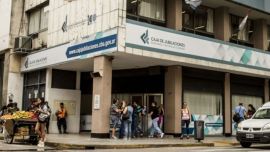COVID-19 ROUND-UP
At press time there was a total of more than 600 confirmed cases of coronavirus and 14 deaths, as compared to 128 cases and three deaths this time last week – however, this increase also needs to be measured against the decentralisation of testing from the Malbrán Institute to five provinces in the course of the week. Yesterday saw the first fatality in the medical profession – a doctor of 59 in Cipoletti, Río Negro. Summing up the week, last weekend the rumour mill was buzzing with reports of an imminent state of siege but this was quickly ruled out by President Alberto Fernández while overcrowded Greater Buenos Aires began to become a focus of concern. There was traffic chaos at the end of the long weekend with 59 access routes to the capital closed while field hospitals began to spring up around the country.
RELIEF MEASURES
The advance of the coronavirus pandemic during the week was accompanied by the proliferation of government relief measures to attenuate the socio-economic damage. The government kicked off the week with somewhat overdue assistance to the informally employed and also the self-employed in the lower tax categories (earning less than 26,092 pesos), totalling some 3.6 million families – these will receive an emergency payment of 10,000 pesos in April, it was announced on Monday night. Then came the turn of those unable to pay their utility bills and companies facing a liquidity crisis while blocked from clearing cheques. A decree published on Wednesday prohibited the providers of electricity, gas, water, telephone, cable television and Internet services from cutting them for the next six months as from March 1 (running until April 30 in the latter two cases), even if bills go unpaid. This benefit is limited to a long list of “vulnerable sectors,” as well as small and medium-sized companies (PyMEs), who further benefit from the end of the ban on clearing cheques being brought ahead one week to last Tuesday in response to business pressures, as well as freeing other banking services such as loading ATMs – the Central Bank further ruled that the obligatory closure of all bank accounts with bouncing cheques is suspended until April 30 while credit may not be denied to companies with social security contribution arrears. On Wednesday President Alberto Fernández announced that a bill would be sent to Congress freezing rents and mortgages at March 20 levels for the next six months. As the week closed, the government contemplated fresh measures to complement its March 17 package to ensure the payment of wages and remitted six billion pesos to the provinces to meet the health crisis (a sum considered insufficient by the recipients).
BORDERS & REPATRIATION
On Thursday night the government decreed the closure of all frontiers for the rest of the month, thus blocking the repatriation of an estimated 10,000-15,000 Argentines still stranded abroad. The freight of essential merchandise is exempted from the closure. Despite 35 flights by Aerolíneas Argentinas (originally entrusted with a monopoly of the repatriation), hundreds of flights by other airlines and two Air Force flights to pick up people in Peru, only around two-thirds of Argentines abroad at the commencement of the quarantine could be returned. The return of some 27,000 people in the space of a week only heightened government anxieties over human congestion at Ezeiza Airport.
MEMORY, TRUTH, JUSTICE
For the first time since Memory, Truth and Justice Day marking the anniversary of the 1976 coup was instituted as a public holiday in 2002, there was no march last Tuesday – instead there were interchanges on social networks and numerous white headscarves inscribed with “Nunca Más” tied to balcony railings. Hebe de Bonafini and Estela Barnes de Carlotto, respectively leaders of Mothers and Grandmothers of Plaza de Mayo, sparked controversy when they said that the pandemic would have been much worse if Mauricio Macri had still been president.
JUJUY GOES ONE FURTHER
One extreme application of coronavirus has been applied in one extreme end of the country, the north-western province of Jujuy, where in the town of Palpalá those defying quarantine were herded into open-air wire cages where they were held for hours in a latter-day version of the old school punishment of standing in the corner. In general, Jujuy has gone beyond the emergency decree of President Alberto Fernández, closing its borders against its own citizens living elsewhere, and also has more infringements of quarantine than the average (with 14 caged in Palpalá last Tuesday alone). Those detained who cannot justify circulating outside are subject to fines of between 40,000 and 340,000 pesos and even prison.
LOVE IN THE TIME OF CORONAVIRUS
When Córdoba couple Diego Aspitia and Sofia Cuggino set last Saturday as their wedding date last year, they had no idea that it would fall on the second day of the coronavirus lockdown but they decided to go ahead anyway, holding a virtual service at home with the evangelical minister tying the knot and some 400 friends and relatives all looking on as “guests” via Instagram and Facebook. Their marriage has still to be legally formalised at a registry office while the wedding party is on hold until the quarantine is over.
PRISON MUTINIES
Even if prison could be defined as involuntary quarantine, Argentina’s penitentiaries were not immune from coronavirus and other tensions last week with extremely violent mutinies in two Santa Fe jails while pressures mounted in Buenos Aires Province. In Las Flores just outside the Santa Fe provincial capital a destructive mutiny raged until Tuesday when the authorities sent in the riot squad but convicts took advantage of the confusion to kill four of the worst sex offenders in their ranks before the situation was brought under control. There were also confrontations in the province’s other two main prisons, Coronda and Piñero, with a fifth death at the former – further deaths are not ruled out with several wounded in all three prisons. In neighbouring Entre Ríos there was an attempted breakout and hunger strike in Concepción del Uruguay. Buenos Aires Province did not reach these extremes but 45,000 inmates crowded into prisons designed for 24,000 stokes fears of coronavirus.
ECONOMIC INDICATORS
As the government braces itself for the economic impact of the quarantine, it received some good news from economic data preceding the coronavirus pandemic – unemployment closed last year at 8.9 percent (fractionally down from the 9.1 percent at the end of 2018, despite all the economic disarray of an electoral year, especially as from last August) while last month’s trade surplus hit 10 digits at US$ 1.3 billion. Nevertheless, neither figure is wholly good news when reading between the lines – underemployment rose from 12.1 to 13.1 percent with jobs increasingly precarious while the trade surplus is not the fruit of any surge in exports (which in fact fell 2.8 percent) but stems from a collapse in imports (-20.1 percent).
MARKETS
While the official exchange rate closed the week at 65.25 pesos per dollar, parallel exchange rates were on either side of the 85-peso mark (more above than below). The Merval stock exchange index fell over five percent for the week but country risk was not dramatically worse, closing at 4,166 points yesterday as against 4,064 points the previous Friday.
BARTOLOMÉ MITRE DIES AT 79
La Nación director Bartolomé Mitre (who would have turned 80 this coming Thursday) died on Wednesday, thus ending 150 consecutive years of the same name at the newspaper’s helm. Mitre was a well-known figure beyond La Nación’s boardroom as an active member of the ADEPA grouping of Argentine media and as a member of the board of directors of the Inter American Press Association (IAPA).

















Comments